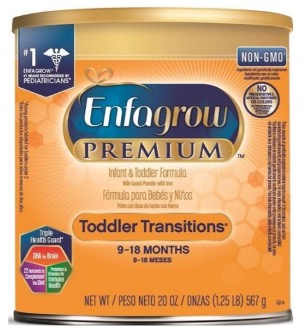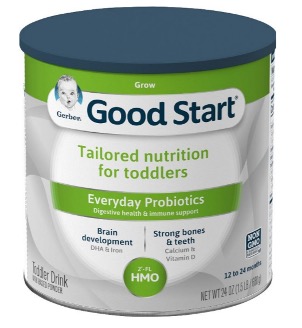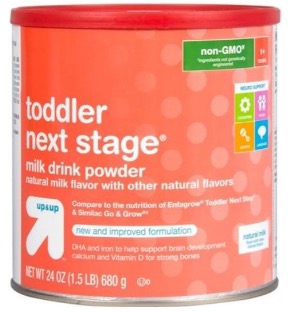Class Actions Challenge ‘Misleading’ Labeling of Enfagrow, Gerber, Up&Up Toddler Transition Formulas [UPDATE]
by Erin Shaak
Last Updated on July 21, 2022
May 12, 2022 – Target Transition Formula Case Closed
The lawsuit against Target was closed on April 20 after the plaintiff failed to file an amended complaint by the deadline set in the judge’s March 18 dismissal order.
March 30, 2022 – Target Transition Formula Lawsuit Dismissed, Plaintiff Can Try Again
The lawsuit against Target was dismissed after a federal judge found that the plaintiff failed to show that a reasonable consumer would be misled by the label of the retailer’s Up&Up brand toddler transition formula.
U.S. District Judge Kenneth M. Karas noted in a March 18 dismissal order that, first of all, the plaintiff lacked standing to pursue injunctive relief because she had not shown that she was at risk of suffering future harm absent a change in the product’s label.
“Because Plaintiff allegedly is now aware that the Product is not recommended by pediatric health experts, does not offer superior nutritional value to the less-expensive whole cow’s milk, and is not non-GMO, Plaintiff cannot plausibly again be deceived by the Product’s label, regardless of whether it is changed,” the judge wrote, stressing that he was “making no findings of fact” as to whether those descriptions were accurate.
Judge Karas went on to throw out the plaintiff’s New York state law allegations, finding that she had failed to identify any misleading statement on the toddler formula’s label that would deceive a reasonable consumer.
“Nowhere on the label does Defendant claim that the Product gives toddlers nutrition that they would not get from other sources, that the Product is necessary for development, that the Product is recommended by pediatric health experts, or that the Product is to toddlers what the Infant Formula is to infants,” the order stated.
The judge further noted that the product label clearly states in the nutrition facts panel that it contains added sugar, agreeing with rulings in other cases that it is “unreasonable—as Plaintiff attempts—to suggest that a consumer is not required to read a product’s label to obtain information.”
Judge Karas went on to find that it would be “unrealistic” for a reasonable consumer to confuse the toddler formula’s non-GMO graphic with the Non-GMO Project’s seal given the only similarity is the use of the term “non-GMO.”
The plaintiff’s unjust enrichment claim was also dismissed as “duplicative” of her other claims, and the judge found that her breach of warranty claims failed because, among other reasons, she had neglected to provide Target with pre-suit notice and allege that the retailer’s product was unfit for human consumption.
Finally, the judge found that the plaintiff had failed to adequately plead her negligent misrepresentation and fraud claims.
Judge Karas gave the plaintiff 30 days to amend her complaint as long as she has “a good faith basis” to do so.
Judge Karas also warned the plaintiff’s counsel, who the judge noted “routinely files” similar cases that are “just as routinely dismissed,” that the attorney will face sanctions if he brings another “frivolous” injunctive relief claim such as the one in this suit. In another footnote, the judge stated that the court will “not hesitate to follow the example of a growing number of its sister courts” and dismiss the plaintiff’s claims with prejudice should they be presented again in a second amended complaint.
Want to stay in the loop on class actions that matter to you? Sign up for ClassAction.org’s free weekly newsletter here.
Three proposed class actions filed on the same day this week claim the “false and misleading” labeling of toddler transition formulas made by Mead Johnson & Company, Gerber Products Company and Target Corporation have deceptively implied that the products are nutritionally appropriate for toddlers.

At the center of the lawsuits is the fact that the names and marketing claims of Enfagrow Premium Toddler Transitions, Gerber Good Start Grow Stage 3, and Up&Up brand Toddler Next Stage milk-based powders are “confusingly similar” to that of the defendants’ formula products intended for infants.
In essence, the cases argue that consumers are misled into believing the milk drink powders contain all the nutrients toddlers need in the same way that infant formulas are considered to be nutritionally appropriate for infants. In truth, the lawsuits claim, the products offer “no unique nutritional value beyond what could be achieved through a nutritionally adequate diet” and contain added sugars not recommended for children under two years old.
According to the cases, the similar labeling of the toddler and infant formula products “causes caregivers to make inaccurate and ill-advised nutritional purchasing decisions” that end up being more expensive than buying the nutritionally superior foods recommended by experts.
In all, the lawsuits allege that the toddler transition formula products are no more than “expensive, re-branded, infant formula” that consumers would not have purchased, or would have paid less for, had they not been deceived by the defendants’ labeling.
The Emergence of Toddler Transition Formulas
 According to the three lawsuits, all filed on November 15, the American Academy of Pediatrics recommends exclusive breastfeeding for the first six months of a child’s life, followed by the addition of complementary foods and the continuation of breastfeeding until the child is at least 12 months old.
According to the three lawsuits, all filed on November 15, the American Academy of Pediatrics recommends exclusive breastfeeding for the first six months of a child’s life, followed by the addition of complementary foods and the continuation of breastfeeding until the child is at least 12 months old.
When infants reach 12 months of age, experts recommend a diet of whole plain cow’s milk, water and healthy foods, according to the suits.
Iron-fortified infant formula is recommended for infants who are not breastfed and is legally defined as a product for use by children not more than 12 months old, the cases explain.
As the suits tell it, increasing rates of breastfeeding since 2003 have led to decreasing sales of infant formula. To make up for falling sales, companies such as the defendants have introduced “transition formulas,” also called “follow-on formulas,” “weaning formulas,” “toddler milks” and “growing-up milks,” for children 12 months or older, per the complaints.
The lawsuits allege that given the toddler transition formulas consist of a milk-based powder with added nutrients, they are “practically identical” to formulas marketed for use by infants—a fact emphasized by the “confusingly similar names”:
· Enfamil “Infant Formula, Milk-based Powder with Iron” and Enfagrow “Infant & Toddler Formula, Milk-based Powder with Iron”
· Good Start “Infant Formula with Iron, Milk Based Powder” and Good Start “Toddler Drink, Milk Based Powder”
· Up&Up “Infant Formula with Iron, Milk-Based Powder” and Up&Up “Toddler Next Stage, Milk Drink Powder”
According to the lawsuits, the names of the toddler formulas do not clearly state what they are in terms that distinguish the products from the infant formulas. The similar names, coupled with the claims, statements and designs of the infant and toddler products lead caregivers to believe that the toddler formulas are nutritionally appropriate for the targeted age groups—nine to 18 months for the Enfagrow product, 12 to 24 months for the Good Start product, and above 12 months for the Up&Up product—and falsely imply that infants and young toddlers have the same nutrient requirements, the suits say.
Moreover, the labels for the Enfagrow and Up&Up products are additionally misleading in that they display an infant formula nutrition panel on a product not intended for infants, giving caregivers the false impression that the products were subject to the same scrutiny and oversight as infant formula products.
“Caregivers receive the incorrect impression that the Product was reviewed by the FDA for use and consumption for their children [between nine and 18 months or older than 12 months], when this is not the case,” the lawsuits read.
Toddler Transition Formulas Contain Fewer Nutrients, More Sugar Than Consumers Expect, Suits Say

The lawsuits argue that, contrary to consumers’ expectations, the Enfagrow, Good Start and Up&Up toddler transition products are not a nutritionally appropriate alternative for toddlers to the expert-recommended diet of cow’s milk, water and healthy foods.
Compared to whole cow’s milk, the defendants’ products generally contain less protein and more carbohydrates and fat, according to the cases.
On top of that, the suits allege that the similarity of the toddler formula labels to that of infant formulas causes caregivers to be more unlikely to notice that the three products contain added sugars, an ingredient that is “inconsistent and contrary” to the nutritional needs of children in each of the products’ age ranges.
Citing a recent study of caregivers’ understanding of transition formula labeling, the lawsuits state that 52 percent of those surveyed believed the products would “give toddlers nutrition that they wouldn’t get from other sources,” while 70 percent of respondents believed the toddler formulas were a suitable drink for children in the marketed age range. Per the complaints, such beliefs are not accurate given experts agree that toddler formulas offer “no unique nutritional value beyond what could be achieved through a nutritionally adequate diet.”
The lawsuits add that the defendants’ products are up to four times more expensive than whole cow’s milk.
According to the suits, the branding and packaging of the Enfagrow, Good Start and Up&Up products were “designed to—and [do]—deceive, mislead, and defraud” consumers, who would not have purchased the products, or would have paid less for them, absent the formula makers’ deceptive advertising.
Who Are the Lawsuits Looking to Cover?
The three cases respectively look to represent New York residents who purchased Enfagrow Premium Toddler Transitions, Gerber Good Start Toddler Drink, or Up&Up Toddler Next Stage products during the applicable statute of limitations period.
What If I Don’t Live in New York?
These three lawsuits are only looking to cover New York residents. If you live in another state, you may want to reach out to an attorney in your area to find out about your legal rights and options.
To find out more about how to start a class action, click here.
How Do I Join the Lawsuits?
At this time, there’s nothing you need to do to join one of the lawsuits discussed on this page. If one or more of the cases move forward and settle, anyone affected should then have an opportunity to claim whatever compensation the court deems just. Find out more about the process here.
Want class action news and updates sent straight to your inbox? Sign up for ClassAction.org’s newsletter here.
Video Game Addiction Lawsuits
If your child suffers from video game addiction — including Fortnite addiction or Roblox addiction — you may be able to take legal action. Gamers 18 to 22 may also qualify.
Learn more:Video Game Addiction Lawsuit
Depo-Provera Lawsuits
Anyone who received Depo-Provera or Depo-Provera SubQ injections and has been diagnosed with meningioma, a type of brain tumor, may be able to take legal action.
Read more: Depo-Provera Lawsuit
How Do I Join a Class Action Lawsuit?
Did you know there's usually nothing you need to do to join, sign up for, or add your name to new class action lawsuits when they're initially filed?
Read more here: How Do I Join a Class Action Lawsuit?
Stay Current
Sign Up For
Our Newsletter
New cases and investigations, settlement deadlines, and news straight to your inbox.
A note on class action complaints:
Bear in mind that the information in this blog post summarizes the allegations put forth in the following legal complaint. At the time of this writing, nothing has been proven in court. Anyone can file a lawsuit, with or without the representation of an attorney, for any reason, and ClassAction.org takes no position on the merits of the suit. Class action complaints are a matter of public record, and our objective on this website is merely to share the information in these legal documents in an easily digestible way.
Before commenting, please review our comment policy.